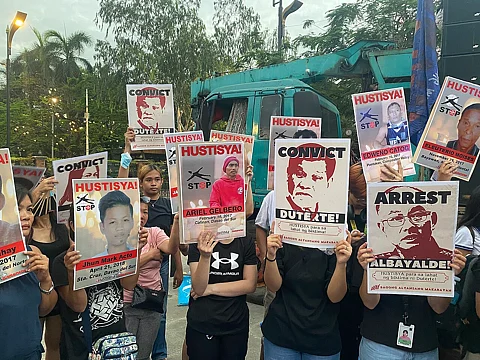

Former Philippine President Rodrigo Duterte is on track to reclaim the mayoralty of Davao City, despite being detained by the International Criminal Court (ICC) on charges of crimes against humanity. The midterm election results, still awaiting official confirmation, also show five Senate seats likely going to candidates aligned with the Duterte family — a strong show of support that highlights the enduring influence of the Duterte political dynasty.
With over 80% of votes counted, Duterte was leading the Davao mayoral race by a wide margin, receiving more than eight times the votes of his closest rival. If confirmed, the 80-year-old would assume a post he held for over two decades, although day-to-day governance is expected to fall to the city’s vice mayor — a role now held by his son, Sebastian Duterte.
Under Philippine law, candidates facing criminal charges, including those in international custody, can run for office unless convicted.
The results provide a timely political boost to Duterte's daughter, Vice President Sara Duterte, who faces an impeachment trial in July. The Senate, where a two-thirds vote is required for conviction, will now include at least four staunch Duterte allies among the 12 new members. Only six of the winning candidates are aligned with President Ferdinand "Bongbong" Marcos Jr., and one of them — Camille Villar — also accepted support from Sara Duterte.
This balance complicates efforts by Marcos and his allies to remove the vice president from office. Sara Duterte was impeached by the House of Representatives in February over allegations that include misuse of public funds and plotting to assassinate the president — charges she denies, calling them politically motivated.
Sara Duterte is seen as a leading contender in the 2028 presidential election. A conviction would not only remove her from office but also bar her from future political runs.
The Marcos and Duterte families were once united. In 2022, Sara Duterte joined Marcos's presidential campaign as his running mate. But the alliance soon fractured over policy differences, particularly Marcos's rejection of the elder Duterte's violent war on drugs, which human rights groups say left tens of thousands dead.
Tensions escalated dramatically in March when Marcos authorized the arrest and extradition of Rodrigo Duterte to the ICC in The Hague. The move was widely condemned by Duterte supporters, who called it a betrayal. Until then, Marcos had publicly rejected the ICC's jurisdiction, consistent with Duterte’s 2019 withdrawal of the Philippines from the court’s founding treaty.
The ICC claims jurisdiction over crimes committed before the withdrawal and accuses Duterte of overseeing mass killings during his presidency and earlier as Davao’s mayor — charges he denies.
His arrest sparked outrage in Davao and other strongholds, fueling a resurgence of Duterte family support. At campaign events, Sara Duterte capitalized on the public’s anger, airing emotional footage of her father’s arrest and portraying it as a politically motivated act of foreign interference.
The Philippines’ midterm elections saw more than 18,000 positions contested, including half the Senate and all seats in the House of Representatives. Nearly 69 million voters were registered. While Marcos-aligned candidates performed well in some areas, the overall results reflected waning public support for the president, whose administration has been criticized over economic struggles and ineffective public messaging.
The Marcos family retains power in its northern stronghold of Ilocos Norte, where relatives of the president won gubernatorial and council posts. But the Dutertes continue to dominate in the south, especially in Davao, where Rodrigo Duterte's return to the mayor’s office — even from detention — was celebrated with fervor. His old Facebook page was flooded with congratulatory messages, with many calling for his release and return.
With only a slim margin of reliable support in the Senate, Marcos faces a significant hurdle in his effort to remove Sara Duterte. The Senate impeachment trial, expected in July, could decide not only the future of the vice president but also reshape the 2028 presidential race.
Analysts say the Duterte family’s resilience in the polls — even under legal siege — is a warning to Marcos: the battle for power between the country’s two most prominent dynasties is far from over.